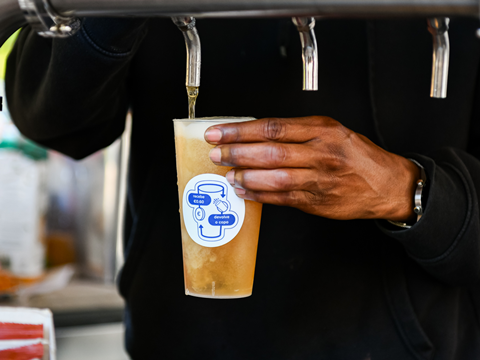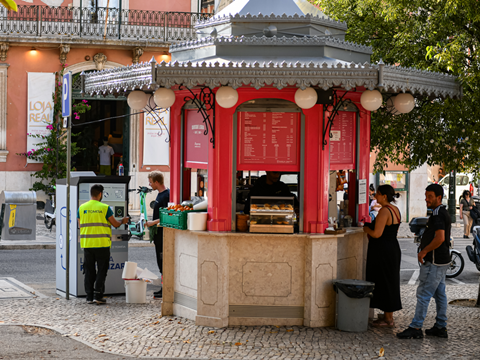
A city-wide reusable cup system with a local deposit-return model is taking place in Lisbon, facilitated by TOMRA, Associação da Hotelaria, Restauração e Similares de Portugal (AHRESP), and city officials.
The first TOMRA-operated return points have been in operation at two historical kiosks in Praça de São Paulo and Praça do Príncipe Real since 27th June. These utilize TOMRA’s Rotake system, a full-service reuse model constituting digital tracking, cup collection, sanitation, and redistribution.
To participate in the system, consumers can purchase drinks in reusable cups for a refundable deposit of €0.60. This is fully refunded when the cups are returned to one of several TOMRA collection machines located throughout the city, at which point consumers can tap a contactless card or smartphone – no registration is required.
A full system roll-out is anticipated for October 2025, with 17 return points planned across the downtown area. This aims to coincide with the Lisbon Municipal Regulation’s ban on single-use plastic cups, and to establish a closed loop for the 25,000 cups thought to be used across Lisbon’s entertainment areas every night.
“We’re proud to partner with Lisbon on this first-of-its-kind city system in a European capital,” said Geir Sæther, head of TOMRA Reuse. “The system deployed in Lisbon is designed specifically for urban areas – making reuse easy, clean and rewarding for everyone involved.
“This is not just about cups. It’s about changing how cities think about resources. Lisbon is showing that with the right partners and smart policy, reuse can be mainstream, modern, and massively effective.”

Portugal’s largest hospitality association, AHRESP, is working with local cafés, bars, and nightlife venues to encourage a transition into reusable cups.
“This initiative represents a necessary shift for the hotel/restaurant/catering (HoReCa) sector, which now takes on an active and central role in the transition towards a more circular economy,” explained Carlos Moura, president of AHRESP. “Establishments not only gain a practical solution to comply with the new regulations, but also an opportunity to lead, together with consumers, a sustainable and positive change in habits for the city of Lisbon.”
“Lisbon is committed to leading by example, promoting sustainable alternatives to single-use plastics and engaging partners in real change toward more conscious consumption habits,” added Rui Cordeiro, city councillor for Waste Management and Circular Economy, City of Lisbon. “This is a concrete step toward building a culture of reuse in our city and inspiring other municipalities to follow the same path.”
This initiative is modelled on the ‘world’s first’ open-managed system for reusable takeaway packaging piloted in the municipality of Aarhus, Denmark. According to TOMRA, over one million cups have been returned so far, while its return rate is thought to have exceeded 85% in 18 months.
A consumer survey suggests that most participants are satisfied with the system, but some called for additional collection machines to be established at or closer to establishments where reusable cups are sold.
During the second year of the pilot, TOMRA plans to rollout of a new collection machine that accepts both reusable beverage cups and food packaging.
Earlier this year, we spoke to Geir Sæther on the Packaging Europe podcast; he discussed the scale-up of reusable packaging in light of the Aarhus trial.
If you liked this story, you might also enjoy:
The ultimate guide to the Packaging and Packaging Waste Regulation in 2025
How are the top brands progressing on packaging sustainability?
Everything you need to know about global packaging sustainability regulation in 2025
The key to increasing the use of reusable packaging in supermarkets













No comments yet